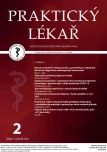-
Medical journals
- Career
The importance of personal internal feelings ("gut feeling") of general practitioners in the diagnosis of oncological diseases
Authors: J. Brož 1; S. Krejčová 2; A. Romanová 1; L. Šimůnková 1; V. Vejtasová 3; J. Urbanová 4; J. Malinovská 1; doc. MUDr. Ludmila Brunerová, Ph.D. 4
Authors‘ workplace: Interní klinika 2. LF UK a FN Motol, Praha, Přednosta: prof. MUDr. Radan Keil, Ph. D. 1; Oddělení klinické psychologie FN Motol, Praha, Primář: Mgr. Markéta Mohaplová 2; Kardiologická klinika 2. LF UK a FN Motol, Praha, Přednosta: prof. MUDr. Josef Veselka, CSc. 3; Interní klinika 3. LF UK a FNKV, Praha, Přednosta: prof. MUDr. Ivan Rychlík, CSc., FASN, FERA 4
Published in: Prakt. Lék. 2022; 102(2): 47-50
Category: Reviews
Overview
The personal gut feelings evoked by first contact with a patient have only been studied more systematically in this millennium. Two types of personal gut feelings, sense of reassurance and sense of alarm, have been distinguished. Some studies show that the sense of reassurance can be taken into account in the diagnostic process for patients with new symptoms of serious illness, including cancer diagnoses.
Keywords:
diagnosis – cancer – gut feeling – sense of reassurance – sense of alarm
Sources
1. Elstein AS, Schwarz A. Clinical problem solving and diagnostic decision making: a selective review of the cognitive literature. BMJ 2002; 324 : 729–732.
2. Baerheim A. The diagnostic process in general practice: has it a two-phase structure? Fam Pract 2001; 18 : 243–245.
3. Barraclough K. Medical intuition. BMJ 2006; 332 : 497.
4. Stolper E, van Bokhoven M, Houben P, et al. The diagnostic role of gut feelings in general practice. A focus group study of the concept and its determinants. BMC Fam Pract 2009; 10 : 17.
5. Hjortdahl P. The influence of general practitioners’ knowledge about their patients on the clinical decision-making process. Scand J Prim Health Care 1992; 10 : 290–294.
6. Oliva-Fanlo B, March S, Gadea-Ruiz C, et al. Prospective observational study on the prevalence and diagnostic value of general practitioners’ gut feelings for cancer and serious diseases. J Gen Intern Med 2022. https://doi.org/10.1007/s11606-021-07352-w
7. Smith CF, Drew S, Ziebland S, Nicholson BD. Understanding the role of GPs‘ gut feelings in diagnosing cancer in primary care: a systematic review and meta-analysis of existing evidence. Br J Gen Pract 2020; 70(698): e612–e621.
8. Holtedahl K, Vedsted P, Borgquist L, et al. Abdominal symptoms in general practice: frequency, cancer suspicions raised, and actions taken by GPs in six European countries. Cohort study with prospective registration of cancer. Heliyon 2017; 3(6): e00328.
9. Hjertholm P, Moth G, Ingeman ML, Vedsted P. Predictive values of GPs’ suspicion of serious disease: a population-based follow-up study. Br J Gen Pract 2014; 64(623): e346–353.
10. Ingeman ML, Christensen MB, Bro F, et al. The Danish cancer pathway for patients with serious non-specific symptoms and signs of cancer – a crosssectional study of patient characteristics and cancer probability. BMC Cancer 2015; 15 : 421.
11. Scheel BI. Cancer suspicion in general practice: the role of symptoms and patient characteristics, and their association with subsequent cancer. Br J Gen Pract 2013; 63(614): e627–e635.
12. National Collaborating Centre for Cancer. Suspected cancer: recognition and referral. NICE guideline. Full guideline. 2015 [online]. Dostupné z: https://www.nice.org.uk/ guidance/ng12/ evidence/full-guideline-pdf-2676000277 [cit. 2022-03-18].
Labels
General practitioner for children and adolescents General practitioner for adults
Article was published inGeneral Practitioner

2022 Issue 2-
All articles in this issue
- The importance of personal internal feelings ("gut feeling") of general practitioners in the diagnosis of oncological diseases
- Nutrition as primary support of immunity
- Patient experience with the use of information and communication technologies in primary care during the COVID-19 pandemic
- Tele-rehabilitation intervention in home balance treatment
- Occupational diseases reported in the Czech Republic in 2021
- Evaluation of the relationship between tools predicting the risk falling in rehabilitation setting in post-stroke patients
- Kapitán Robert Falcon Scott (1868–1912) dosáhl jižního pólu „až“ jako druhý
- Nezapomínáte na prevenci? Přeočkování proti tetanu je stále důležité
- General Practitioner
- Journal archive
- Current issue
- Online only
- About the journal
Most read in this issue- Nutrition as primary support of immunity
- The importance of personal internal feelings ("gut feeling") of general practitioners in the diagnosis of oncological diseases
- Patient experience with the use of information and communication technologies in primary care during the COVID-19 pandemic
- Occupational diseases reported in the Czech Republic in 2021
Login#ADS_BOTTOM_SCRIPTS#Forgotten passwordEnter the email address that you registered with. We will send you instructions on how to set a new password.
- Career

